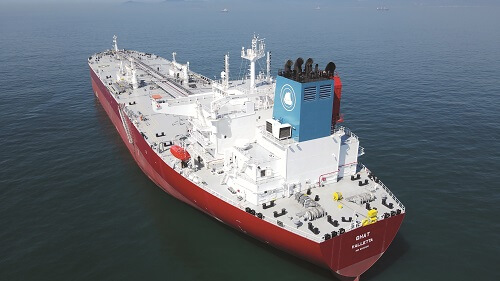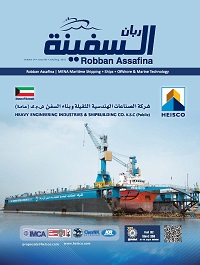Libya’s General National Maritime Transport Company Expands its Fleet Development Plan
Libya’s General National Maritime Transport Company (GNMTC) is looking to further develop its fleet, in its near future plans to lower the vessels’ average age to 3-5 years, and acquire additional LNG carriers of different sizes complying with the market’s requirements. Khaled Al-Tawati, GNMTC’s CEO talks to Robban Assafina about the company’s fleet development vision.
How do see the company’s position on the regional and international maritime chart? And what about GNMTC’s journey up until today?
We strive to hold a prominent position among the leading companies through our business with major clients, as our fleet complies with the requirements of major oil companies’ coalition. As for the company’s journey, I can tell you it is a successful experience by all standards, despite going through critical turns that led at one stage to bankruptcy, that is when the state presented the necessary funding for the company to restore its position in the local and international market. In a quick overview of the company, it was founded in 1975 with a capital of 100 million Libyan dinars, and full authority to engage in business with public and private companies both local and international, as well as setting training, development and human investment policies, in addition to transporting the largest amount of Libya’s exports and imports, through owning, selling and performing chartering activities for all types of ships and tankers.
After nearly reaching bankruptcy, how was the recovery process?
The company transported the imports of the Libyan state, as well as the imports of the public and the private companies to provide the needs of the local market. This had raised the level of burdens which led to weakening the fleet capacity and depleting savings, and eventually causing a deficit in the balance of payments. The company almost reached bankruptcy late 2002, but it was restructured late 2003, with remedial measures put in place to help through the recovery process. And from that date on, the company's activities focused on operating obsolete ships, where 7 were kept, and fleet development commenced through acquiring new tankers. The company was able to acquire some new ships after securing loans from local and international banks as well as from Libyan financial institutions.
The company’s capital was raised to approximately one billion dollars in 2008 and 2009, based on a resolution by the Council of Ministers back then. Between 2006 and 2013, The company’s fleet consisted of 25 ships of different types and sizes. During these years, the company developed rapidly, but this quickly turned downwards due to turmoil hitting the country in 2011, which caused a setback similar to what we have faced back in 2002. So ever since, we have been working to solve problems stacked up from previous years, but we were able to rise again and develop our fleet, achieving our goals.
GNMTC has managed in a short period to develop its fleet, acquiring 3 newbuildings in 2021, and two new oil carriers recently in 2022. What are your future expectations of this expansion plan?
We are working according to a fleet development plan in cooperation with MSI Management and Consulting Services, which in turn provides an extensive study of market conditions for various types of tankers. Therefore, our expansion plans in the field of tankers are still ongoing and we seek to include these new ships, which we expect will be a whole new phase in the company’s business in terms of achieving the highest rates of revenue and reducing expenses compared to previous years. As the age of some ships has become a constant challenge to achieving good operating income in line with the company's plan, we hope to achieve our goals by acquiring new vessels and selling obsolete ones, which have become a burden on the company's budget.
How does enhancing your fleet serve the company’s plans of going international?
Development plans are essential for any company in order to preserve a prominent position, especially in a highly competitive field such as ours, requiring flexibility in management and firmness in implementing regulations, and therefore it is a somewhat a difficult equation, but it becomes easy if you manage your own tools, which are mainly the human cadre - ship - client. The key to success is the way of separately doing business with each party to reach a common goal. Client’s trust can only be attained by achieving the first two elements: the human cadre that can meet their requirements to guarantee shipments’ delivery on time with complete professionalism, as well as advanced ships that work according to the latest systems without any technical difficulties. This ensures carrying out tasks to the fullest, thus achieving our motto "Trust, high quality and safety are the key to our success."
How is GNMTC handling the sector’s challenges?
Full commitment to the highest quality standards in all our services has always been a priority. Our fleet development plan ensures that all our ships meet the latest IMO requirements, such as reducing emissions, installing ballast water treatment systems and scrubbers. The new ships do meet these requirements, and the installation of these systems has been scheduled on a number of other ships. It is worth mentioning that these systems have already been installed on ships such as: Maetiga, Cartagena and others, in addition to the new ships: Ebn Hawkel, Fezzan, Anwaar Benghazi, Anwaar Tarablus and Ghat.

Getting the recent ISO certificates for the quality management system and the environmental management system is another extra point for the company’s competitiveness skills. What do you have to say about that aspect?
Fleet development requires developing the department that manages this fleet, and therefore this step was important for us. We have managed to set a work program to raise our efficiency, and we achieved that, as the management has successfully obtained the ISO 9001:2014 quality management system certificate, as well as the ISO 14001:2014 environmental management system certificate. This clearly enhances our clients’ trust and helps us manage our business in a safe and effective manner, and most importantly, meets the targets of developing our human cadre to raise company’s standards and readiness and be highly professional.
What projects do you intend to execute on in the near future?
With the help of advisory and executive teams, our fleet development plan 20-23, which carries our vision and aspirations for the near future, involves lowering the age of the fleet, seeking to have ships of only 3-5 years, as well as acquiring new LNG carriers of different sizes that meet the market requirements, and are compatible with our capabilities. Another expansion plan is also on the way, as we seek to operate commercial vessels, whether by purchasing or chartering, in addition to purchasing some vessels specialized in the maintenance of offshore platforms, which we see as a great challenge that will provide new job opportunities for the local skills.
How do you evaluate your cooperation with the governmental maritime administrations in Libya, and how does the company contribute to the development of this field?
As a leading company in its field in Libya, GNMTC contributes to the development of young cadets by adopting training programs for fresh graduates according to a training plan prepared annually. We also work according to a specific timetable to provide all services and facilities to our crews in order to raise their competencies and their ability to join qualification and training courses in cooperation with renowned Arabian maritime academies.
As for the cooperation with some governmental administrations in Libya, well that is an obligation and not an option in many cases, whether when completing some procedures or coordinating with flag authorities or the Ministry of transportation. You can say that we are making our way with the help of our young cadres and experience in this field. In light of the challenges we face in the market and the intense competition in terms of demand and supply, we hope that governmental administrations understand the nature of our work in the international market and its requirements, especially the Ministries of Transportation and Education, in addition to coordinating and working to provide the needs of institutions working in this field.
| Read Here | |
 |
|



































